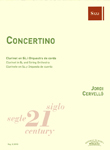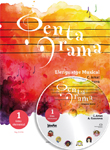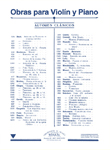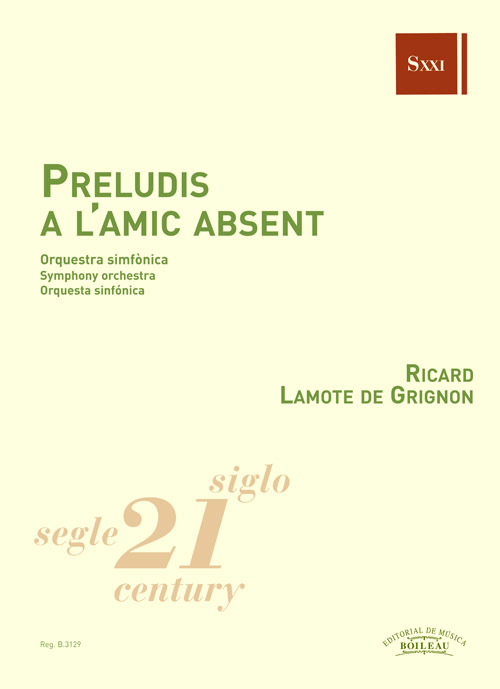WORKS
- Genre
-
Musical education
- Choir
- Counterpoint
- Dictation
- Direction
- Exam study manuals
- General music pedagogy
- Harmony
- Hearing
- Illustrations / Posters
- Improvisation / Sight reading
- Instrument methods
- Instrument pedagogy
- Instrumental study repertoire
- Instrumentation and orquestration
- Musical language
- Solfège
- Templates
- Theory and analysis
-
Incidental music
-
Lined paper
-
Flamenco
-
Religious music
-
Classical / contemporary
-
Modern music
-
Folk music / traditional
-
Musicology
-
Divulgation
-
Games and hobbies
-
Music therapy
-
Children / Youth
-
- Instruments
- Ensemble
- Difficulty level
- Period
- Genre
SOPORTE
Search
Find here: books, scores, composers, digital pieces, cd's
Best-selling works
Our classics

Newsletter
I wish to be informed of the news about your music
We have received your e-mail correctly
Multimedia
Preludis a l'amic absent
Symphonyc Orchestra
LAMOTE DE GRIGNON, RicardLAMOTE DE GRIGNON, RicardLAMOTE DE GRIGNON, RicardReg.: B.3129
27,60 €
P.V.P. (VAT included 4%)
Add to cart
- Ensemble: Symphonic orchestra: .
- Genres: Classical / contemporary: Symphonic.
- Product format: Partitura
- Difficulty level: Advanced-superior
- Period: 1st half S. XX
- Publishing house: Editorial Boileau
- Collection: Siglo XXI
- No. of pages: 72
- Measure: 31,00 x 23,00 cm
- Lenght: 23'25"
- ISMN: 979-0-3503-1009-6
- Available in digital: No
- Available for rent: Yes
3[1.2.3/pic] 3[1.2.Eh] 3[1.2.bcl] 3[1.2.cbn] — 4 3 3 1 — tmp+3 — str
perc: bd, sus cym, tri, ttam, cym, sd
THE MATERIALS HAVE TO BE HIRED
Version for Symphony Orchestra of Preludis a l'Amic absent for piano (Preludes to the Absent Friend).
Preludis a l´amic absent [Preludes for the Absent Friend] by Ricard Lamote de Grignon is, without doubt, his most notable work for piano, and possibly one of the most important pieces of Catalan piano music written in the first half of the 20th Century. Equally notable, although much less known, is the composer’s version for symphonic orchestra and harp, also written in 1935, which was premiered at the Liceo on March 19, 1936 —four months before the Spanish Civil War began.
Preludis a l´amic absent is dedicated to his friend Ventura Gassol, who was exiled for political reasons following his arrest on the ship Uruguay due to the proclamation of the Catalan State by Lluís Companys. The three Preludes are based on a unusual compositional technique: each one uses only seven notes of the twelve notes of the chromatic scale. This technique, rather than limiting the expressive possibilities of the music, allowed the composer to create an individual atmosphere in each piece. The first Prelude is solid, with certain similarities to Scriabin in the lyrical middle section. The second Prelude is tempestuous, but, like the first one, also has a middle section which is more tranquil in which there is an ostinato accompaniment for the broad melody, which seems to recall Mussorgsky. The third Prelude is similar to the floating, ethereal sonorities of Debussy.
I. Lent
II. Agitat
III. Serenament








